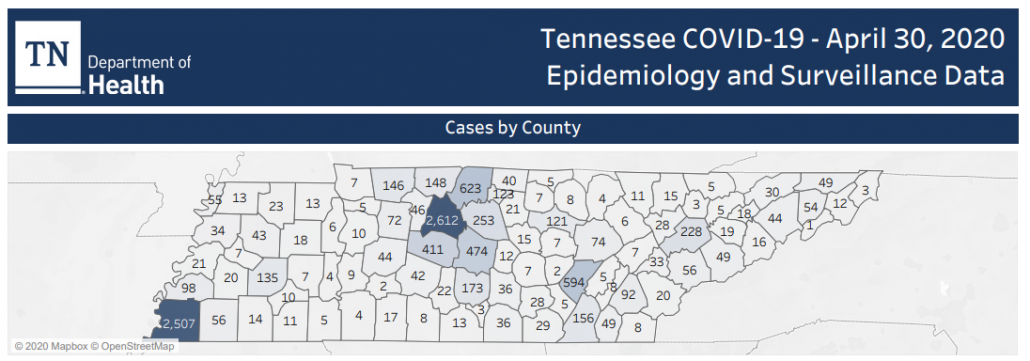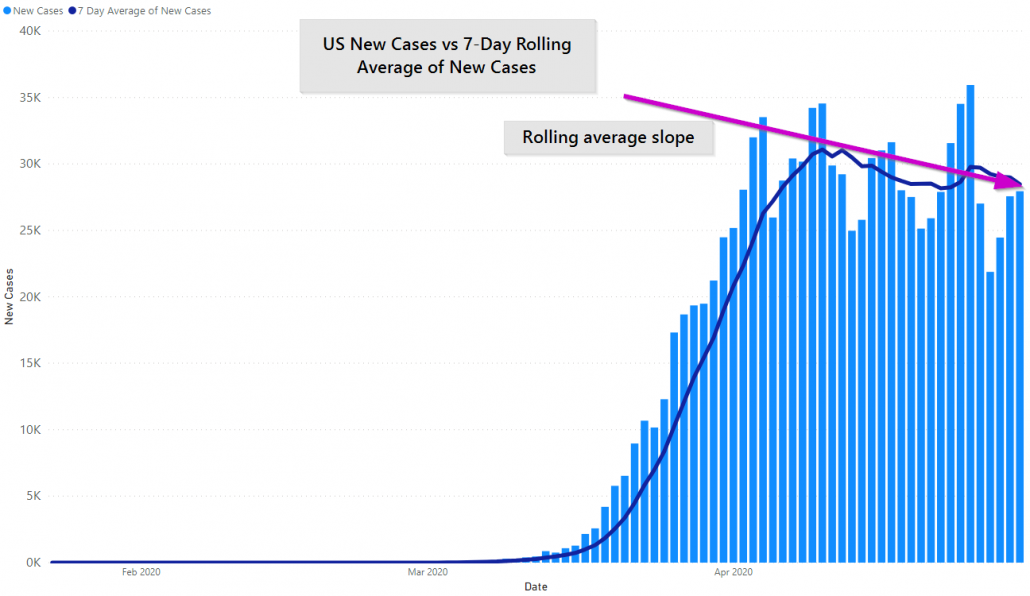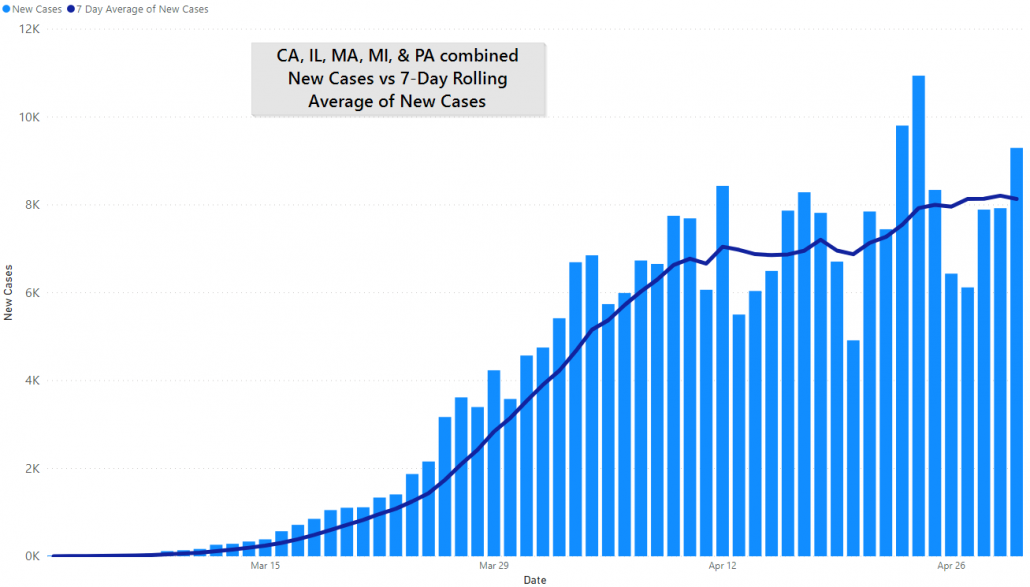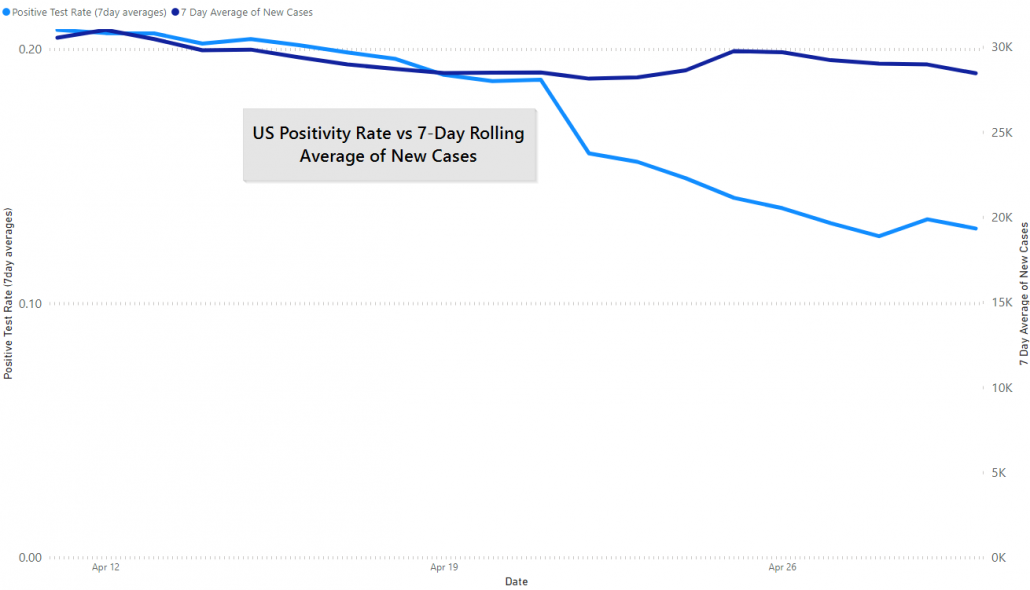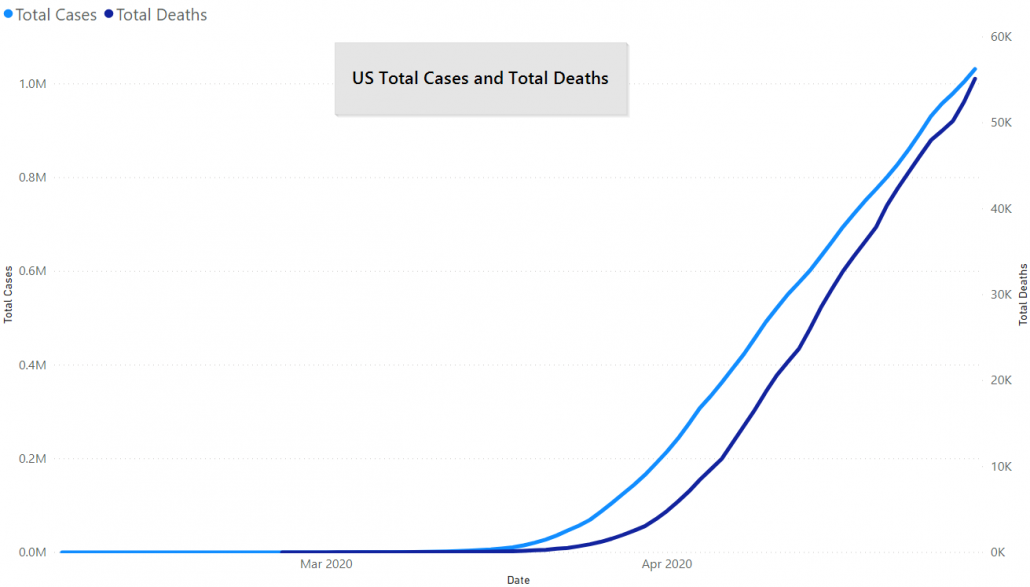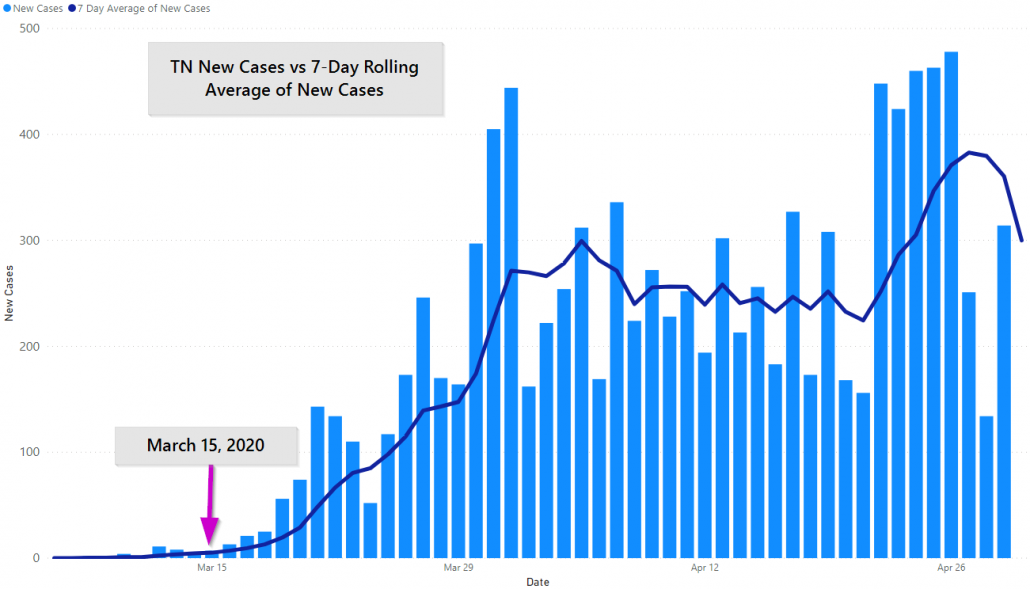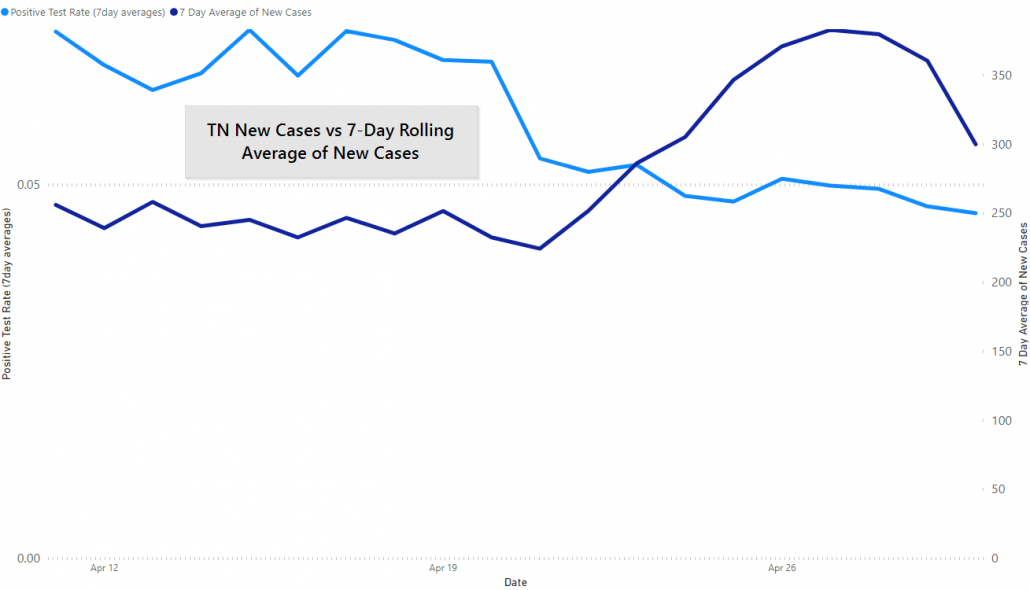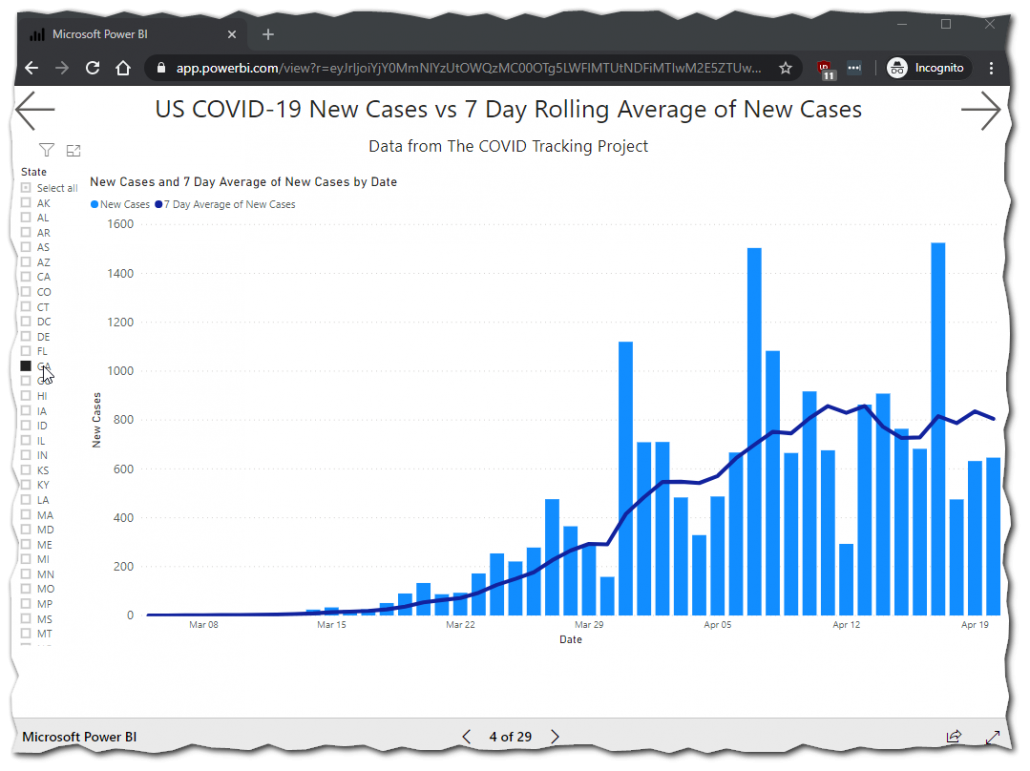Today we’re going to talk about Knox County opening, some thoughts on fighting COVID-19 from Singapore and Hong Kong, then go over the numbers
Knox County – Open for Business, Kinda
May 1st Tennessee essentially throws open its doors to business, (at 50% capacity at any rate), with only a handful of industries still closed everyone else is allowed to open. Knox County is taking a phased approach that is significantly more measured and has materially more amounts of guidance to date. So, is it safe to go back out?
East Tennessee is as different a story to the rest of the state as Tennessee is to the nation as a whole. While Knox County cases have risen in the last couple of days, as a whole, they’ve been incredibly slowly steady over the last 6 weeks. This heatmap from Tennessee Department of Health shows how different the cases are in and around Memphis and Nashville:
While each person ought to and needs to take their own risk factors into account, the next two weeks are probably about as safe to head out in Knox County as we’ve had since February. Our cumulative positivity rate was 3.4% on Tuesday in Knox County, with about 1.4% of the population tested. Those are both fairly robust numbers with such a low rate of overall cases.
With all of that said, at JM Addington — and personally — we don’t plan to change behavior in the next month. (You can see our operations plan here). The primary driver behind this is that if, as a community, we open up too fast and spread coronavirus faster than expected we won’t fully see the impact in the numbers until the 3rd or 4th week of May. Somewhere between May 15th and May 25th we’ll re-assess and see if we feel it’s prudent to loosen our own internal restrictions.
Until then, we’re aren’t increasing our shopping trips at home and we’re mostly working from home with only essential trips to client sites. We need a haircut as badly as anyone else, but, at least your author, won’t be getting one in the first half of May.
In a broader context we are actively planning on a second wave hitting, even though that is an unknown currently. That potentially gives us two to four months between waves to work on things corporately and personally before hunkering back down again. We hope to post on this more fully soon.
Hong Kong & Singapore
The New York Academy of Sciences held a free COVID-19 webinar today featuring Dr. Gabriel Leung of University of Hong Kong, Dr. Vernon Lee from the Singapore Ministry of Health and Dr. Jennifer Dowd from the University of Oxford.
For comparison, Hong Kong has over 7 million people in a land area that fits inside Nashville, including portions being population-dense as Manhattan. Singapore has 5.8 million people with a higher population density than Hong Kong. Singapore has a total fo 16,000 cases (about where Indiana is at today) and Hong Kong just over 1,000 cases.
In both cases, but especially Hong Kong, case-targeted approaches were used first and population-based measures second. (Scholarly source on Hong Kong) For example, Hong Kong started by requiring temperature checks of all inbound travelers in January and only cut off non-Hong Kongers in late March. Testing and contract tracing were also in place late January but bars only closed in late March (and restaurants, incredibly, are still open). Amusements parks and sports closed early but nightclubs much later
There is nuance, to be sure (see the NEJM article for details), but both Kong Kong and Singapore seemed to favor precise tools first and hammers second. We suspect our US public health experts would agree with that style of approach, however, we clearly didn’t implement the more precise approaches in a level that even can contest with Hong Kong or Singapore.
“This will be over one day, but it is a marathon. The exit strategy is science… that is our best and only exit strategy.”
Dr. Gabriel Leung
Numbers
The national numbers continue to be… the same. We have slowed the growth, but barely, and the we’re testing better, but still need to do significantly better.
The biggest thing that doesn’t show on these charts is the geographic movement of cases. While New York continues to lead the way, New Jersey, Massachusetts, Illinois, California, Pennsylvania and Michigan all have over 40,000 cases. It’s not even clear that COVID has peaked in these places.
Positivity rate
The number of confirmed cases divided by total tests performed. This gives one an idea on if enough tests are being performed. Dr. Fauci has indicated that he’d like to see the US at 10%.
It’s hard to even detect a decline in the cumulative cases and deaths. Deaths are actually ticking up, which is concerning.
Tennessee continues to fare better than the national trends, although we put a marker back in today’s graph to remind ourselves about where things were the last time that we were eating out, around March 15th. It would be three days later that we posted our first public article on COVID-19, writing, “For those of you in East Tennessee, no new cases today. Statewide we’re at 98 up from about 78 yesterday. Those are focused around Nashville right now.” Tennessee COVID-19 cases are up over 100x since that first post, 6 weeks ago.
By the way, if you want to see the same graphs for your state click here, we pull nearly all of our own visuals from this report. Typically updated at the same time the evening’s post goes up.
Here are GA new cases.
Also, you can do it on your phone but it is much easier to navigate on a bigger screen.
Knox County continues to have very low new cases, with eight new cases today, and 232 overall.
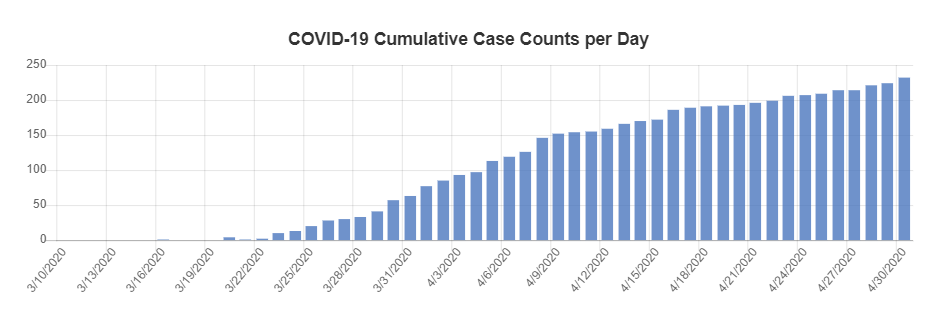
Area cases are ticking up at a similar rate.
We’ll give Governor Lee the last word today, as we think it makes a big difference on how the next 30 days go:
Tennesseans have to stay committed to social distancing.
GOVERNOR Lee, April 28th, 2020
These posts helpful?
Then go ahead and share them where you saw them once or twice a week.
Get In Touch
Need help thinking this through? Access to more data? Help getting your technology in order to handle what’s here and what’s coming? Contact us today.
[wpforms id=”4995″]Other
Thanks to those that have shared kind words or liked these posts. We’re doing out best to put out data-driven analysis, each one of these takes about 2 hours. It’s helpful to know that they are being read.
If you want copies of the Excel sheet and PowerBI Reports we use to put these together email us, info@jmaddington.com. Right now, our PowerBI combines data from JHU, NYT, COVID Tracking Project, IMHE and the TN Department of Health. Most sets are updated daily.

Download our Report!
Get your copy of What Every Business Owner Must Know About Hiring an Honest, Competent, Responsive, and Fairly-Priced Computer Consultant.

